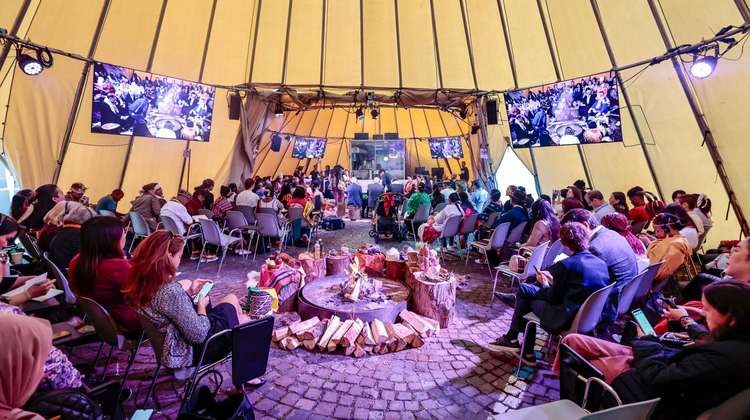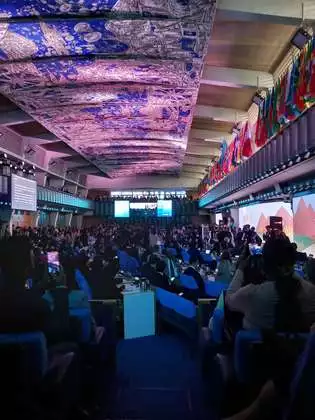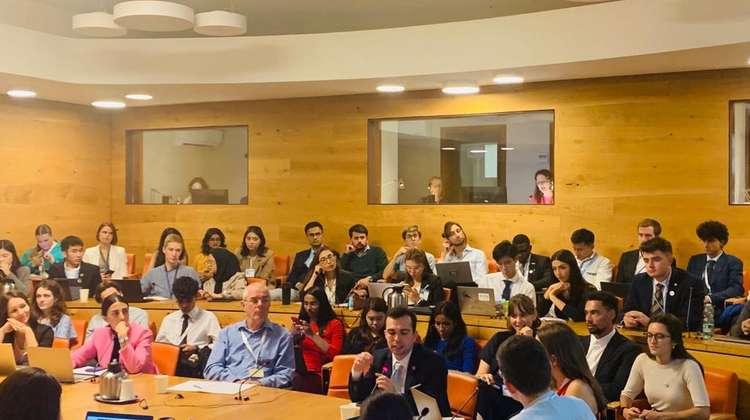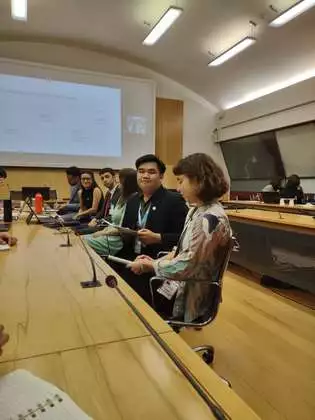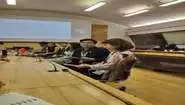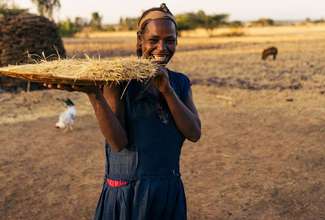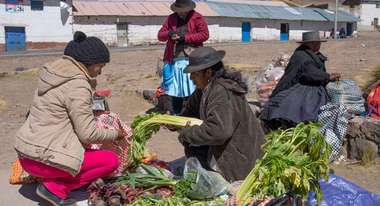Youth-Led Food Systems Transformation: Highlights from the World Food Forum 2023
In a world grappling with the challenges of climate change, food insecurity, and the urgent need for sustainable solutions, the World Food Forum's third edition Flagship Event in October 2023 provided a timely platform for an intergenerational exchange.
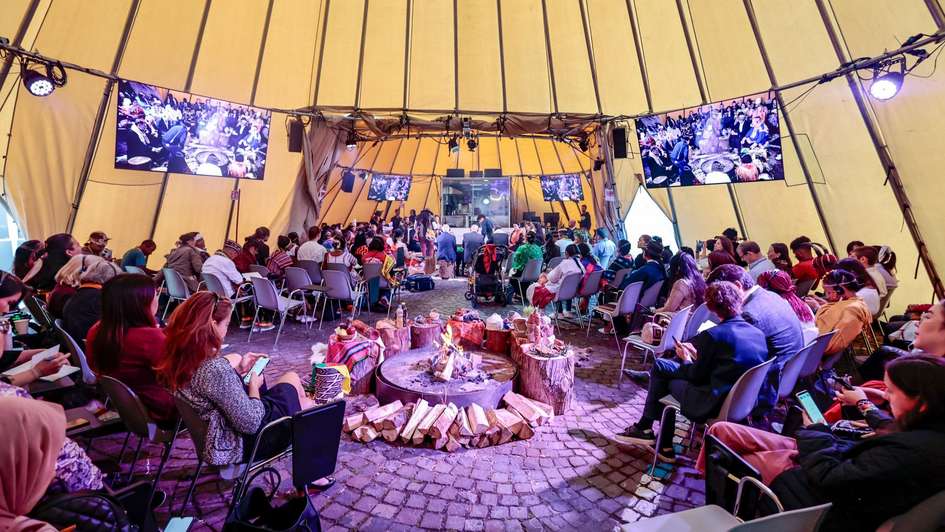
Under the theme "Agrifood systems transformation accelerates climate action", this event aimed to gather stakeholders from all over the world dedicated to transforming our agricultural and food systems to achieve the Sustainable Development Goals (SDGs). With over 5,000 on-site participants and more than 20,000 online viewers, the World Food Forum has emerged as a powerful platform for change.
Youth-Led Movement?
The World Food Forum is a youth-led network leveraging the power of youth, investment and innovation, to forge new paths towards a more sustainable, resilient, inclusive and hunger-free future. However, as the grand opening ceremony unfolded, I began to wonder if the event needed to live up to its youth-led ideals. High-level stakeholders and presidents delivered speeches emphasising the fight against hunger and the role of the youth. But there were hardly any young people on the stage or in the crowd, which raised concerns about whether this was yet another "youth-washing" event, only inclusive on paper.
That being said, the World Food Forum went on to be pleasantly surprising and has eased my initial concerns. What followed the high-level opening event was a week featuring over 200 events led by young people with meaningful dialogues, workshops, and discussions across various fields. These exchanges aimed to initiate action, create sustainable impact, and accelerate progress at local, regional, and global levels.
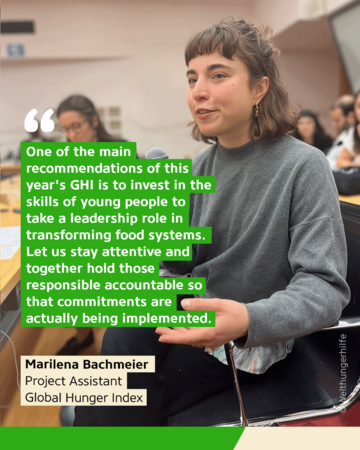
Youth Engagement for a Sustainable Future
One of the highlights of the Conference was the Global Youth Forum where the focus of events was the emphasis on youth engagement in global decision-making processes. Events like the "Youth Action in Implementation of National Pathways: Follow-up of the Food Systems Summit Stock Taking Moment " were particularly enriching by promoting intergenerational exchanges. Here for instance Stefanos Fotiou, Director of the FAO Office of Sustainable Development Goals and UNFSS Coordination Hub was discussing in a heated roundtable debate with young people on what youth can do to promote the UNFSS national pathways in their respective countries.
In the regional Youth Assembly Africa, I was able to hear from young people all across Africa on their policy priority areas and complemented action plans, which are: 1) inclusive policy-making, 2) incentivising environmentally and socially friendly practices, 3) scale-up sustainable technologies, 4) support for vulnerable groups, 5) investment in resilient and nature-positive agrifood systems. Here I had the chance to bring in the recommendations and key findings of this year's Global Hunger Index: The Power of Youth in Shaping Food Systems, which explores the critical role of youth in shaping food systems that fulfill the right to adequate food for current and future generations. The GHI data and recommendations have been the source of enriching discussions with people working on the ground and have been taken up by many young people around the world. In the workshop "Getting active for the climate and the planet one bite at a time" young people formed groups to collaboratively develop concepts to promote a nutritious and environmentally friendly diet. These events, among many more, exemplified the vital role young people play in driving climate action and sustainability. The need for a national accountability mechanism was a key takeaway, underlining the importance of holding leaders accountable for their promises.
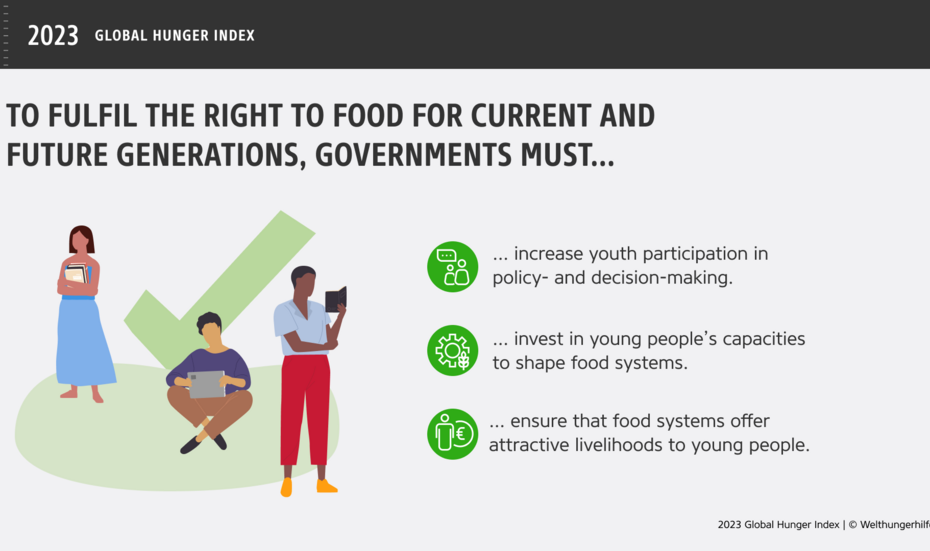
Science and Innovation for Climate Action and Sustainable Food Systems
The global agrifood systems currently account for a significant portion of greenhouse gas emissions and are a major contributor to terrestrial biodiversity loss. The World Food Forum showcased young entrepreneurs from around the world who are actively addressing these issues with innovative and sustainable solutions.
For instance, Zebra CropBank from Nigeria is creating a post-harvest service platform to help farmers store and monetize their produce. Sustainable Planet, a London-based female co-founded company, focuses on growing water lentils, which are rich in protein, to support global food and protein supply. Stellapps in India is digitizing the dairy supply chain to enhance milk productivity, quality, and traceability, thereby helping farmers increase profits and reduce their carbon footprint. Organicin Scientific introduced bacteriocins as a sustainable alternative to chemical antibiotics.
These are just a few examples of the incredible contributions of young innovators who are determined to address the consequences of climate change. The World Food Forum demonstrated the motivation and creativity of young people in making our food systems more sustainable. This spirit of innovation and dynamism among young people is exactly what the guest authors Mendy Ndlovu and Wendy Geza talk about in their essay in this year's GHI.
Knowledge and the Role of Indigenous Peoples
In addition to youth involvement, the World Food Forum also acknowledged the indispensable role of Indigenous Peoples and small-scale farmers in agrifood systems. Indigenous youth from various corners of the world shared their experiences and insights, enriching the discussions with their perspectives. They shared their challenges regarding rights, lands, territories, or resources and highlighted the importance of our traditional Indigenous food as an instrument of effective expression of their food sovereignty in action.
The profound appreciation of food, the environment, and nature expressed by these young Indigenous individuals was truly inspirational. It was a stark contrast to the more Westernised view of knowledge and education, highlighting the significance of preserving different forms of knowledge found in various communities. Indigenous youth act as a bridge between intergenerational science, knowledge, and techniques essential for sustainable food production.
One key takeaway: Knowledge and what you consider educated depends on the society in which you grow up and which has influenced you. There are so many different forms of knowledge to be preserved and they can differ from community to community.
Not Another Competitive Rally
Like most global platforms, also the World Food Forum is accompanied by criticism. The event may well be seen more as a competing FAO event to the annual meeting of the Committee on World Food Security (CFS), which takes place the week after. Moreover, it is heavily orchestrated by the FAO. It is critical and not profitable to have too many competing events, briefings, speeches and initiatives which are in the end all working towards the same goal – to fight hunger. It would be more effective if all forces joined together and stood up as a united front for the same goals. However, I would like to emphasise the unique nature of the WFF, as the focus is entirely on the youth and their innovative ideas. By nurturing these young talents, the event encourages innovative thinking and the creation of long-term sustainable solutions. Throughout the week, young people organized events, participated, and engaged in forward-looking content, creating a strong network of dynamic future leaders. The participants of this conference will shape the future of sustainable food systems, making it a vital platform for nurturing the leaders of tomorrow.
The Power of Multistakeholder Collaboration
The World Food Forum exemplifies the need for multistakeholder platforms to facilitate intergenerational dialogues among leaders and partners in agrifood systems. Only when different generations come together – from civil society, governments, the private sector, and science – can we create long-term and sustainable solutions.
However, it's not enough to provide opportunities for young people on a global platform. National mechanisms are necessary to ensure the implementation of decisions and the involvement of young people in the process. These mechanisms are vital for holding those responsible accountable, making sure that the talk at global meetings translates into action.
In conclusion, the World Food Forum 2023 stands as a testament to the potential of youth-led movements in tackling the world's most pressing challenges. It showcased the innovation, dedication, and resilience of young people as they strive to transform our agrifood systems and accelerate climate action. As we look towards the future, it's clear that young leaders will play a pivotal role in building sustainable food systems for generations to come. The World Food Forum has provided a platform where the voices of these leaders can be heard, and their actions can make a difference. It was great to be part of this and to “walk the talk” of the 2023 Global Hunger Index.
For the next event, however, I would like to see the youth in the middle seats and on stage for the opening ceremony and the presidents and secretary generals on the sideline to listen.





